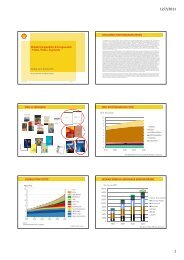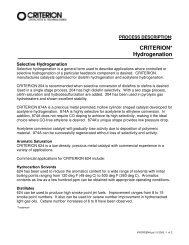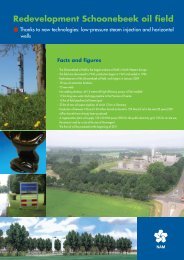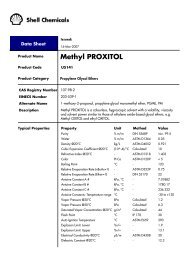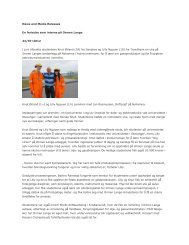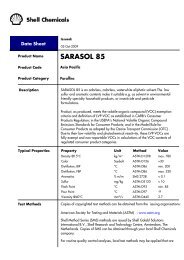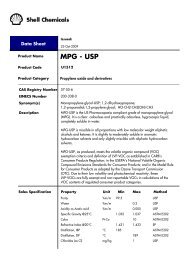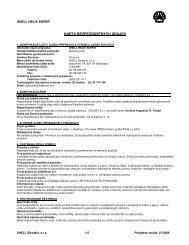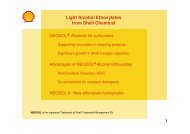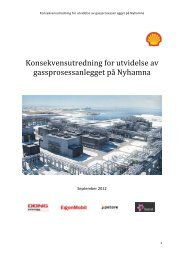Shell Global Solutions - Business News - Bright Future
Shell Global Solutions - Business News - Bright Future
Shell Global Solutions - Business News - Bright Future
Create successful ePaper yourself
Turn your PDF publications into a flip-book with our unique Google optimized e-Paper software.
BUSINESS NEWS<br />
<strong>Bright</strong> future<br />
Today’s refiners prepare to meet tomorrow’s challenges<br />
R<br />
efiners are facing more challenges<br />
today than ever before, with demands<br />
being made by many stakeholders.<br />
Customers continue to want performance<br />
and fuel economy and are increasingly<br />
concerned about their role in contributing<br />
to greenhouse gas emissions. Governments<br />
are also concerned about emissions and,<br />
at the same time, are interested in energy<br />
security and supporting local agriculture,<br />
all of which are contributing to a drive for<br />
increasing market penetration of biofuels.<br />
Shareholders, although attracted to<br />
investing in the industry because of current<br />
high margins, are concerned about cost<br />
inflation and the sustainability of returns<br />
over the medium-to-long term.<br />
The recent improved margins come as<br />
a relief in an industry that has, in the last<br />
few years, undergone a long period of low<br />
investment. But it is important for refiners<br />
to understand the drivers for refining<br />
margins in order to prepare for the future.<br />
Colin Crooks, Supply Envelope Manager<br />
for Central Eastern Europe, Mediterranean<br />
and the CIS, <strong>Shell</strong> Polska SP, describes<br />
the background to today’s situation and<br />
identifies four primary drivers. The first<br />
is growth in the demand for oil products.<br />
“In the late 1990s and the early part of this<br />
decade, there was a period of unusually<br />
low demand growth. In 2003, and more<br />
dramatically in 2004, we saw a return to<br />
high levels of demand growth,” says Crooks.<br />
“When the demand for oil products is<br />
high, refineries are run at near-maximum<br />
operating rates, and this is the second<br />
driver,” he adds. “When this happens,<br />
the simple distillation barrel, or the<br />
hydroskimming barrel, becomes profitable<br />
or at least break-even. That lifts the whole<br />
refinery margin curve, and the other morecomplex<br />
barrels generate a lot more money.”<br />
The third driver is the length in global<br />
fuel oil supplies. During the late 1990s,<br />
there was a steady decrease in the demand<br />
for fuel oil, as fuel oil was replaced by<br />
natural gas in the energy mix. Between<br />
2003 and 2005, the increased production<br />
of gasoline and diesel resulted in a surplus<br />
of fuel oil as a by-product. With no<br />
demand for the extra fuel oil, it now goes to<br />
the power sector for electricity generation<br />
and attracts a relatively low value, priced<br />
equivalent to the natural gas it displaces.<br />
“High crude oil prices are the fourth<br />
driver – a result of the failure of non-<br />
10 impact Issue 3, 2007 www.shell.com/globalsolutions
OPEC supply to meet expectations year<br />
on year, and the need for OPEC to supply<br />
the balance,” says Crooks. Spare capacity<br />
in OPEC during 2003–2005 dropped<br />
significantly, which helped to support prices<br />
owing to a supply risk premium. Another<br />
influence in the crude oil price was the<br />
need for non-OPEC countries to invest in<br />
incremental exploration and production.<br />
The investment community led up the<br />
future price of oil because they identified the<br />
need for a higher price to justify investment<br />
in, for example, deep-sea drilling and<br />
producing oil from difficult environments.<br />
The low fuel oil prices combined with<br />
high crude oil prices translated into high<br />
upgrading margins for those refineries able<br />
to convert fuel oil into lighter products.<br />
Looking to the future, energy demand<br />
is set to continue to increase globally,<br />
especially in Asia. Growing demand and<br />
high margins are driving investment. “We<br />
are seeing the largest wave of conversion<br />
capacity growth since the 1970s,” says<br />
Crooks. “Increased conversion capacity<br />
consumes fuel oil. The price of fuel oil<br />
could rise and potentially squeeze margins.<br />
There is a risk of distillation capacity<br />
overbuild putting some pressure on margins<br />
in the future.”<br />
However, two of the counterbalancing<br />
forces to this are the escalating costs<br />
of projects and the limitations in the<br />
physical capacity of the engineering and<br />
construction sector to build new projects.<br />
Therefore, not all the capacity that is being<br />
planned will come on-stream and that<br />
might support margins.<br />
Crooks points to the imbalance of<br />
demand and supply around the world and<br />
the trade flows that serve to rebalance the<br />
surpluses and deficits: “In Europe, there is<br />
a surplus of gasoline and an undersupply<br />
of diesel. As the Middle East increases its<br />
refining capacity, it will extend exports to<br />
the West as well as its traditional markets<br />
in the East. There will be an opportunity<br />
for Russia and the CIS countries, as they<br />
continue to invest in product quality<br />
capabilities, to export diesel to Europe.<br />
“The biggest challenge is in the Atlantic<br />
Basin. Europe’s gasoline surplus has<br />
traditionally found a home in the USA.<br />
However, the import requirements of the<br />
USA could decrease as the country increases<br />
its refining capacity and substitutes gasoline<br />
with ethanol. The imbalance here will be<br />
difficult to solve, even with the trade flows,”<br />
notes Crooks.<br />
Biofuels are an increasingly important<br />
part of the fuels mix; Europe is unable<br />
to produce enough to meet legislative<br />
requirements, and there will be a need for<br />
imports. Replacing gasoline with biofuels<br />
will mean a decrease in the demand for<br />
gasoline, further contributing to the surplus<br />
in Europe.<br />
Another stress on refiners is that they<br />
need to keep investing in product-quality<br />
specifications, for example, the sulphur<br />
specifications for gasoline and diesel, which<br />
requires capital investment but does not<br />
add value. This puts stress on cash flow and<br />
the ability to invest in growth projects.<br />
“The industry has always been cyclical,<br />
and there is no reason to suppose the future<br />
will be any different. The high margins<br />
that we have enjoyed recently will start to<br />
decline, and we will end up going through<br />
another period of tight margins in the<br />
PRESENTING: Colin Crooks at <strong>Shell</strong> <strong>Global</strong> <strong>Solutions</strong>’<br />
Regional Symposium, which was held this year in Italy.<br />
industry. When that happens, refiners will<br />
need to be ready,” he affirms.<br />
<strong>Shell</strong> is responding by focusing on<br />
operational excellence, process safety, asset<br />
integrity, reliability, availability and project<br />
excellence – executing projects properly and<br />
achieving flawless start-up.<br />
“A key factor is maintaining cost<br />
discipline. There is a tendency, when<br />
margins are good, to take the focus off<br />
costs. By keeping strict control of their<br />
operating costs, when the situation does<br />
change in the future, refiners with the best<br />
cost structure will be in a good position,”<br />
concludes Crooks.<br />
Another way of staying ahead of the<br />
game is to take advantage of technology<br />
and innovation. The <strong>Shell</strong> group places<br />
considerable emphasis on innovation, for<br />
example, pioneering technology such as<br />
gas-to-liquids and coal gasification. One<br />
thing is certain: refiners cannot relax in<br />
their search for improvement. However<br />
hard companies work to be at the top of the<br />
range, it requires continuous improvement<br />
to stay there.<br />
• Contact: Mark Junner<br />
Email: mark.junner@shell.com<br />
Issue 3, 2007 www.shell.com/globalsolutions<br />
impact 11



